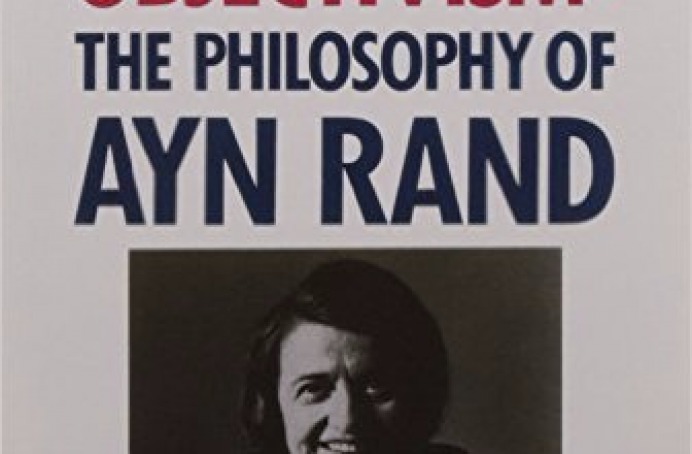Book

Objectivism: The Philosophy of Ayn Rand
THE 25TH ANNIVERSARY EDITION—The definitive statement of Ayn Rand’s philosophy as interpreted by her best student and chosen heir.
This brilliantly conceived and organized book is Dr. Leonard Peikoff’s classic text on the abstract principles and practical applications of Objectivism, based on his lecture series “The Philosophy of Objectivism.” Ayn Rand said of these lectures: “Until or unless I write a comprehensive treatise on my philosophy, Dr. Peikoff’s course is the only authorized presentation of the entire theoretical structure of Objectivism—that is, the only one that I know of my knowledge to be fully accurate.”
In Objectivism, Peikoff covers every philosophic topic that Rand regarded as important—from certainty to money, from logic to art, from measurement to sex. Drawn from Rand’s published works as well as in-depth conversations between her and Peikoff, these chapters illuminate Objectivism—and its creator—with startling clarity. With Objectivism, the millions of readers who have been transformed by Atlas Shrugged and The Fountainhead will discover the full philosophical system underlying Ayn Rand’s work.
This brilliantly conceived and organized book is Dr. Leonard Peikoff’s classic text on the abstract principles and practical applications of Objectivism, based on his lecture series “The Philosophy of Objectivism.” Ayn Rand said of these lectures: “Until or unless I write a comprehensive treatise on my philosophy, Dr. Peikoff’s course is the only authorized presentation of the entire theoretical structure of Objectivism—that is, the only one that I know of my knowledge to be fully accurate.”
In Objectivism, Peikoff covers every philosophic topic that Rand regarded as important—from certainty to money, from logic to art, from measurement to sex. Drawn from Rand’s published works as well as in-depth conversations between her and Peikoff, these chapters illuminate Objectivism—and its creator—with startling clarity. With Objectivism, the millions of readers who have been transformed by Atlas Shrugged and The Fountainhead will discover the full philosophical system underlying Ayn Rand’s work.
aboutLiberty Portal
Liberty Portal is your gateway for free markets and free thinking. We aggregate open-sourced content to promote and popularize important people and lessons within the liberty movement.
suggested
Joel Greene
The Immunity Code

The immunity code represents a powerful paradigm shift to an immune centric approach aging and health, and how to slow it dramatically in easy, practical steps. A new era has arrived. It is an era where commonalities found in the physiology of the leanest, healthiest, and longest lived humans has been uncovered. The startling discovery is that many of these commonalities can be replicated by anyone, and quite easily. But the key is not found in fitness, or bodybuilding or weight loss, or anything we knew prior. The foundation is an immune centric approach to health and aging. The Immunity Code is simply a new paradigm and an entirely new way think about caring for the body.
Read more
Doug Brignole
The Physics of Resistance Exercise

Every year, countless individuals engage in a resistance training program in an attempt to either enlarge their muscle size for enhanced physical appearance, increase their muscle strength for improved athletic performance, or maintain the ability to perform the activities of daily living that are important to them.
Read more
Murray Rothbard
The Rothbard Reader

Few economists manage to produce a body of work that boasts a serious following twenty years after their deaths. Murray N. Rothbard is a rare exception. More than two decades since his passing, his influence lives on, both in the work of a new generation of social scientists, and among a growing number of the general public.
One reason for Rothbard’s continuing popularity is his ability to reach across disciplines, and to connect them: unlike many contemporary economists, who specialize in increasingly narrow fields within the science, Rothbard’s research agenda was expansive and interdisciplinary, covering most of the social sciences and humanities.
Some readers of this book will already be familiar with Rothbard’s major works, such as his path-breaking treatise on economics, Man, Economy, and State. Yet Rothbard also produced hundreds of shorter works for both academic and popular audiences. Unfortunately, many lack the time to explore his writings; what’s more, his oeuvre is so enormous it is often difficult to know where to begin.
This book aims to solve these problems by providing a window into Rothbard’s achievements in the social sciences, humanities, and beyond. It includes introductory, intermediate, and advanced material, to ensure the book can be enjoyed by readers of all levels of understanding and familiarity with Rothbard’s work. Therefore although it is intended primarily for newcomers, veteran readers will also find much to discover or re-discover in these pages.
The individual articles in this collection can be read in any order; with that in mind, we propose two ways to explore them. Those new to Rothbard’s writing may want to begin with the shorter, more accessible chapters that interest them most, before continuing on to more difficult topics. However, we have intentionally arranged the articles and sections so that readers who prefer a systematic discussion, or who are already acquainted with Rothbard’s ideas, can read the book cover to cover.
The volume begins with a personal look at Rothbard’s life and work, as told in his own words. The opening section, “Rothbard: Man, Economist, and Anti-Statist,” brings together three rare interviews, each highlighting different aspects of his unique personality and worldview. Readers will soon recognize an overarching theme running through Rothbard’s life and work: a passion for liberty, a unifying principle in his thought, no matter the discipline.
This commitment can be seen further in the next section, “Foundations of Social Science and the Free Society.” In the first essay, Rothbard stresses “The Discipline of Liberty” as the foundation for the study of humanity. This central interest serves as inspiration and foundation for the project that follows, namely, an outline of the human sciences and their primary method of investigation: praxeology.
Although Rothbard wrote on many subjects, his training—and heart—were in economics, and so too are the majority of the writings in this collection. The next two sections provide a concise exposition of economic theory, beginning with individual value and choice. They explore in turn Rothbard’s insights into the “Principles of Economics and Government Intervention” and “Money, Banking, and the Business Cycle.” Together, these chapters provide a brief overview of Rothbard’s more comprehensive account of economic theory in Man, Economy, and State.
Austrian economists have always been fascinated by the history of their science, and Rothbard was no exception. In fact, his writings on the subject are among his most original and controversial. The section devoted to the “History of Economic Thought” surveys the contributions of many influential economists, outlining the development of economics from mercantilism to the modern Austrian school.
However, Rothbard’s historical interests extended far beyond the history of economic doctrines. The section on “Economic History” illustrates how he consistently a
Read moreOne reason for Rothbard’s continuing popularity is his ability to reach across disciplines, and to connect them: unlike many contemporary economists, who specialize in increasingly narrow fields within the science, Rothbard’s research agenda was expansive and interdisciplinary, covering most of the social sciences and humanities.
Some readers of this book will already be familiar with Rothbard’s major works, such as his path-breaking treatise on economics, Man, Economy, and State. Yet Rothbard also produced hundreds of shorter works for both academic and popular audiences. Unfortunately, many lack the time to explore his writings; what’s more, his oeuvre is so enormous it is often difficult to know where to begin.
This book aims to solve these problems by providing a window into Rothbard’s achievements in the social sciences, humanities, and beyond. It includes introductory, intermediate, and advanced material, to ensure the book can be enjoyed by readers of all levels of understanding and familiarity with Rothbard’s work. Therefore although it is intended primarily for newcomers, veteran readers will also find much to discover or re-discover in these pages.
The individual articles in this collection can be read in any order; with that in mind, we propose two ways to explore them. Those new to Rothbard’s writing may want to begin with the shorter, more accessible chapters that interest them most, before continuing on to more difficult topics. However, we have intentionally arranged the articles and sections so that readers who prefer a systematic discussion, or who are already acquainted with Rothbard’s ideas, can read the book cover to cover.
The volume begins with a personal look at Rothbard’s life and work, as told in his own words. The opening section, “Rothbard: Man, Economist, and Anti-Statist,” brings together three rare interviews, each highlighting different aspects of his unique personality and worldview. Readers will soon recognize an overarching theme running through Rothbard’s life and work: a passion for liberty, a unifying principle in his thought, no matter the discipline.
This commitment can be seen further in the next section, “Foundations of Social Science and the Free Society.” In the first essay, Rothbard stresses “The Discipline of Liberty” as the foundation for the study of humanity. This central interest serves as inspiration and foundation for the project that follows, namely, an outline of the human sciences and their primary method of investigation: praxeology.
Although Rothbard wrote on many subjects, his training—and heart—were in economics, and so too are the majority of the writings in this collection. The next two sections provide a concise exposition of economic theory, beginning with individual value and choice. They explore in turn Rothbard’s insights into the “Principles of Economics and Government Intervention” and “Money, Banking, and the Business Cycle.” Together, these chapters provide a brief overview of Rothbard’s more comprehensive account of economic theory in Man, Economy, and State.
Austrian economists have always been fascinated by the history of their science, and Rothbard was no exception. In fact, his writings on the subject are among his most original and controversial. The section devoted to the “History of Economic Thought” surveys the contributions of many influential economists, outlining the development of economics from mercantilism to the modern Austrian school.
However, Rothbard’s historical interests extended far beyond the history of economic doctrines. The section on “Economic History” illustrates how he consistently a


